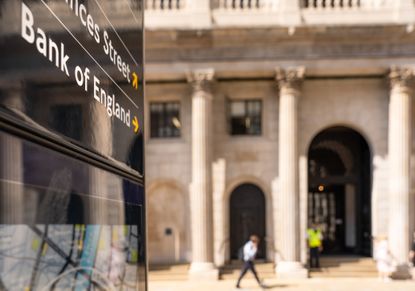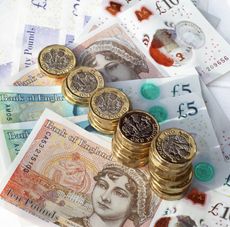Interest rates rise to 2.25%
The Bank of England has hiked rates from 1.75% to 2.25%, the highest level since 2008. We explain what this means for your money


The Bank of England has raised interest rates for the seventh time in a row, increasing them from 1.75% to 2.25%.
It marks the second consecutive 0.5 percentage point rate hike, taking interest rates to a 14-year high. The last time they were at this level was during the 2008 financial crisis.
The big rise will pile pressure on millions of households who may already be struggling with the soaring cost of living. This includes homeowners with variable-rate mortgages or those with fixed rates about to expire, who will see a sharp increase in monthly payments. Credit card borrowers may also see their payments spiral.
Andrew Fisher, chief commercial officer at Freedom Finance, a lending marketplace, said: “Homeowners and first-time buyers up and down the country will be further concerned about an imminent mortgage shock at the same time as they grapple with cost-of-living pressures and the potential impact of a stamp duty cut.
“The Bank of England rate has risen from 0.1% to 2.25% in just one year and mortgage rates have risen sharply.”
However, it could spell good news for savers, as interest rates on savings accounts and cash ISAs should go up too. This is unlikely to happen immediately though, as banks and building societies can be slow to pass a rate rise onto savers.
The decision to raise rates is an attempt to slow inflation, which is running at 9.9%. The Bank of England will be hoping to bring inflation down towards its 2% target.
Look After My Bills Newsletter
Get the best money-saving tips, tricks and deals sent straight to your inbox every week. Make sense of your money in partnership with The Money Edit.
But what does the rate hike mean for your finances? We explain how it will affect you if you have a mortgage or savings.
INTEREST RATE RISE: IMPACT ON VARIABLE-RATE MORTGAGES
About 2m homeowners are on a variable-rate mortgage, such as a tracker deal, or a standard variable rate (SVR).
These mortgage rates will go up as a result of the Bank of England rate rise, pushing up customers’ monthly payments.
Someone with a £250,000 home could see their monthly mortgage bill rise by £62, or £744 a year, according to the credit broker TotallyMoney.
For a £400,000 home the extra monthly cost could be £99, or £1,188 a year.
Most lenders are usually quick to raise variable mortgage rates following a Bank of England rate rise, but this isn’t always immediate. This means you may have a small window of opportunity to protect your household finances by locking into a fixed-rate deal.
INTEREST RATE RISE: IMPACT ON FIXED-RATE MORTGAGES
If you’ve got a fixed-rate mortgage, then any rise in interest rates won’t immediately affect you.
However, once your fixed rate finishes, you may find the next deal you get is a lot more expensive.
According to TotallyMoney, about 3.2m homeowners with a fixed-rate deal are heading for a payment shock as their current offer expires within the next two years.
Alastair Douglas, chief executive of TotallyMoney, says those homeowners should start planning ahead; they will need to find a new deal (which will likely be higher than their current rate), or face being put on their lender’s SVR.
The average two-year fixed rate is currently 4.24%, the highest level since January 2013, according to the data provider Moneyfacts. In December, it was just 2.34%.
Meanwhile, five-year mortgage rates are at their highest since November 2012: the average deal is 4.33%, compared to 2.64% in December.
Someone who fixed their mortgage two years ago with £200,000 of borrowing who is now remortgaging currently faces a massive £2,124 a year rise in costs, according to calculations by the investment platform AJ Bell.
If the 0.5 percentage point hike by the Bank of England is passed onto mortgage rates, the extra annual mortgage cost would rise to £2,736.
If your mortgage deal is coming to an end within the next six months, bear in mind you can normally lock in a new deal three to six months before your current one finishes.
Homeowners with a bit of spare cash should also consider overpaying their mortgage to bring it down a loan-to-value bracket, such as from 75% to 70%, before they remortgage, as this could get them a better rate. Check first if there’s an annual overpayment limit - it’s often 10% - because if you breach this you’ll incur a penalty.
INTEREST RATE RISE: IMPACT ON SAVINGS
Savers may be excited by another interest rate rise as this should in theory mean they get a higher return on their cash.
However, banks and building societies do not have to raise their rates immediately - and even then it may only be a 0.1% or 0.25% uplift, rather than the full 0.5%.
Having said that, there are plenty of good deals at the moment with savings providers regularly raising rates and jostling for the top spot on best-buy tables.
Laura Suter, head of personal finance at AJ Bell, said: “Interest rates on cash savings have come a long way, with the top easy-access rate standing at just 0.65% before the Bank started the current rate rise bonanza in December last year. Now that stands at almost 2% and is expected to go higher still in the coming weeks.”
Some of the best rates on offer are from building societies and smaller banks, rather than the main high-street banks. So don’t stick with a big bank out of loyalty - compare rates and move your money to get the best deal. Some savers could find they switch from an account paying just 0.1% interest to one offering 2% or even 3%. Which could make a huge difference to your finances at a time when bills are rising during the cost of living crisis.
You can find the best savings accounts in our article.
HOW HIGH COULD INTEREST RATES GO?
Households should brace themselves for further interest rate rises. The consultancy Capital Economics believes rates could reach 4% next year, before starting to fall in the first half of 2024.
While interest rates rose by half a percentage point this month, three members out of the 11-strong Monetary Policy Committee - which sets interest rates at the Bank of England - wanted rates to rise faster, by 0.75 percentage points.
The Bank of England said the introduction of the Energy Price Guarantee will serve to dampen inflation, but it is still warning that inflation is expected to remain above 10% over the next few months, before dropping in 2023.
This means it’s highly likely interest rates will rise again this year.
Ruth Emery is contributing editor at The Money Edit. Ruth is passionate about helping people feel more confident about their finances. She was previously editor of Times Money Mentor, and prior to that was deputy Money editor at The Sunday Times. A multi-award winning journalist, Ruth started her career on a pensions magazine at the FT Group, and has also worked at Money Observer and Money Advice Service. Outside of work, she is a mum to two young children, a magistrate and an NHS volunteer.
-
 Three energy firms pay £8m in switching compensation - has your provider paid out?
Three energy firms pay £8m in switching compensation - has your provider paid out?More than 100,000 customers have received compensation after changing providers, but is now a good time to switch energy suppliers?
By Tom Higgins Published
-
 Save £300 on your supermarket shop with cashback accounts
Save £300 on your supermarket shop with cashback accountsBanks, credit card companies and cashback sites are all offering cashback on your supermarket shop, but can you use them all to max out your savings?
By Vaishali Varu Published
-
 Save £300 on your supermarket shop with cashback accounts
Save £300 on your supermarket shop with cashback accountsBanks, credit card companies and cashback sites are all offering cashback on your supermarket shop, but can you use them all to max out your savings?
By Vaishali Varu Published
-
 More than 150,000 grandparents missing out on £1,500 state pension uplift: how to claim
More than 150,000 grandparents missing out on £1,500 state pension uplift: how to claimGrandparents who provide childcare by looking after their grandchildren could be missing out on valuable state pension money worth thousands. We look at how much extra you could get and if you’re eligible
By Stephanie Baxter Published
-
 Can you reclaim bank charges?
Can you reclaim bank charges?If you’ve incurred bank charges over the years, these can add up to hundreds of pounds – but can you get your money back? We look at whether you can make a claim and how to do it
By Stephanie Baxter Published
-
 HSBC extends deadline for customers to secure bigger interest-free overdraft
HSBC extends deadline for customers to secure bigger interest-free overdraftHSBC customers now have until 10 May to increase their interest-free overdraft limit from £25 to £500. First Direct, Lloyds and Nationwide also offer similar support. We explain everything you need to know
By Katie Binns Last updated
-
 New banking hub locations revealed - is there one near you?
New banking hub locations revealed - is there one near you?The rise of banking hubs is in response to a stream of local branch closes. With more planned to launch soon, we look at what services they offer and where you can find one
By Stephanie Baxter Published
-
 April 2023 premium bond winners revealed - are you a millionaire?
April 2023 premium bond winners revealed - are you a millionaire?Two premium bond holders have won £1 million each this month and there are many other prizes for another 5,018,742 winners in April. We look at how to find out if you’ve won
By Stephanie Baxter Published
-
 Get more for your money with a stocks and shares ISA
Get more for your money with a stocks and shares ISAA stocks and shares ISA could grow your money faster than a cash ISA. But what is it exactly and who is it suitable for?
By Ruth Emery Published
-
 Help to Save scheme extended – act now for £1,200 bonus
Help to Save scheme extended – act now for £1,200 bonusThe government has extended the Help to Save scheme - we explain how it works and who is eligible
By Kalpana Fitzpatrick Last updated